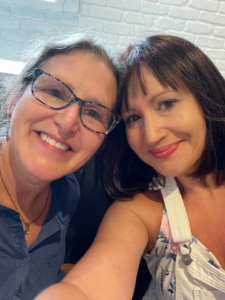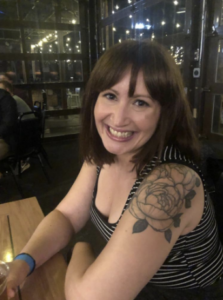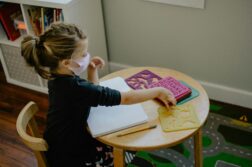
I am sitting in a booth at the Olive Garden across from my mother, but it doesn’t look like her. Her voice is still raspy and sweet, with the Long Island Jewish accent that sang me lullabies as a kid and growled at me as a teen. She smells the same, too—a combination of potting soil, patchouli-scented lotion, and zucchini bread. I’ve never been more comforted by these little, unchangeable details as I look at the stranger who calls herself Darlene.
“I suppose your father told you,” Mom says.
“No,” I reply. “Dad cried before he could finish his sentence. Then he told me to ask you, which I have a feeling I don’t want to do,” I add. She’s distant and moody, often in her own world and less in mine. She’s flakey and off her game. She’s keeping secrets. I don’t know what they are, but they are as large as the air is heavy between us.
“We’re getting a divorce,” Mom says. A lingering silence accompanies my blank stare. Suddenly, the endless breadsticks and salad manifest into a new, endless purgatory, trapping me between my need to fall apart and the room of strangers surrounding me. I resent her for fencing in my meltdown.
“Why?” I ask.
My eyes are watery, and through blurred vision I look up and see the waitress drop off our dinners. She’s all smiles, so I try to contort my face into something that resembles one, too. I can’t even feign the most basic human interaction: a fake smile to match her fake smile.
“Because I’m gay,” she adds.
“That’s why?” The wheels begin to turn, and the puzzle pieces fall into place. “Is it Annie?”
“You knew?” Mom asks.
“Mom, as far as I knew you and Dad had the perfect marriage. All of my friends think the same; you’re everybody’s role model couple. You never fought, you got along, and I know you had a good sex life because I could hear you; I’m a light sleeper. Were you faking it?” Where am I getting the nerve right now?, I think to myself.
“Excuse me?” She chokes on her water.
“Were you faking being straight all this time?”
I realize these are deathbed questions. One question leads to five, and soon enough they become unanswerable anyway. Does my being stem from deception, not love? If my mother lived honestly, if she didn’t fear judgment from her own mother, if society gave her a softer place to be herself, would I be me? Would I be at all?
“I always knew I wanted kids. Back in the ‘70s you had to get married to have kids. I knew I had an inkling, but I did, and still do, love your father. That’s why making this decision was so hard. He’s my best friend,” she says. “I’m terrified of losing that. Mostly, I’m terrified of hurting him.”
I was hoping to get a yes or no answer, but I realize now it wasn’t a yes or no question. Categories make life easy to understand, but they are imprecise. We do not live in a Manichean world in which everything is safely dichotomous: good/bad, black/white, republican/democrat, gay/ straight. Boundaries are fluid, and we are complex creatures. Looking at life any other way is reductive, eventually making fools of us all. Right now, I’m playing the fool.
“Uh huh,” I say, nodding along while she explains, but, truthfully, I have no idea what to say. I also don’t know how much of this I can bear to hear. Slow-motion trauma. I have a finite threshold for it.
“You don’t fall in love with a gender, you fall in love with a person,” Mom says.
“Uh huh,” I reply, as if it’s a universal truth: we fall in love with people as individuals, not their gender. I am following a new logic, though I don’t quite understand it.
“It’s Annie,” I say.
This one is black and white. Annie is my mom’s friend at the post office where they work. I think back: what were mere oddities at the time turned out to confirm this new logic, too. Annie saw my school play. I thought that was strange. Next, my mother chopped off her beautiful curls in favor of a shorter style, and insisted on being called her proper name, Darlene. Then she stopped eating carbs, right before she stopped eating altogether. Now, my mom wears a bikini. It’s like seeing a giraffe transform into a pony, a pony formally known as Dolly. It was a nickname from birth (it’s not her fault she looks like a doll) that sits cast aside, like the shedded skin of snakes, a remnant of a time long gone.
One day at the beach, in her skinny body, Darlene told me that she was bored. She didn’t follow through with a reason for her boredom, or maybe I never gave her the opportunity to do so, because I immediately told her to take a class. She took a “pottery class,” but she never did bring home anything she made. My idea for self-soothing became her cover, go figure. I didn’t know she was a volcano on the verge of explosive I thought she was bored in the way I got bored.
“Yes,” she says. “It’s Annie.”
In the days and weeks to follow, my father sits befuddled on the couch, teary-eyed in his robe, conducting a mental autopsy of his marriage. Occasionally, I interrupt his nightmare with my presence. Darlene isn’t home a lot. She’s making pottery. When she’s home, she’s sleeping.
“You’re done being raised,” my dad says.
“Excuse me?” I reply. “I’m seventeen.”
“Your point?” Dad asks.
I am surprised he doesn’t pull out a cigarette at that very moment. Somehow, a cigarette feels like the right prop to match my newly careless father. But as a runner, smoking is the last thing that he would ever do. But telling me I am done being raised feels just as out of place. How could he abandon me at a time like this?
“I don’t know anything. You’re smarter than me. Go live your life. Don’t let this ruin your senior year,” he says. Mind you, my father is quite literally the smartest person I’ve ever known. He’s been deflated.
“You’re telling me I don’t have a curfew? I don’t have to come home? Are you sure? Dr. Phil would say I need structure,” I respond.
“As far as I’m concerned, we’re roommates. And Dr. Phil is a jerkoff,” he says.
Enough said.
Four months later, my mom moves out. It is the day after Christmas.
I am left with a sad father who makes me his therapist. I am fairly certain he should be talking to a professional, or at the very least, a stranger. Telling me that he never cheated on my mother is reassuring, but makes my heart ache more. An active sex life? I vomit.
My father is one of my favorite people, though I never tell him this. Sometimes, things go to his head. He is the person from whom I get my irreverent and dark sense of humor, my love for reading, and my eclectic musical taste. When my mom left, I watched him turn to running when he could have turned to booze. And I watched him turn to God when he could have hidden under his bed. My father forgave my mother, and he gave me the blueprint for how to survive with dignity in a world that is less forgiving.
My mother and I were always close, despite this blip in our relationship. Eventually, Annie broke her heart, as affairs often disintegrate into what they always were: a band aid. Today, my mother is with a woman I would proudly call Mom. Now, my mother looks like an appropriately-aged version of the woman who once sang me lullabies. Her hair is often tied back in a long, stringy braid that sits on her right shoulder. She once considered braiding it in dreadlocks, and thankfully grew out of that, too. She answers to Dolly again. She owns makeup, and once in a great while, wears a bra. She is perfection. New mother. New father. New logic.
 Caitlin Hanratty teaches high school English in the Hudson Valley and is a co advisor for the Gay Straight Alliance (GSA). An edited version of this essay was originally written for the students in GSA. She lives in Franklin, NJ, with her pitbull Lucy, and her father, whom she inherited post-divorce (hers, not his). In her free time, Caitlin enjoys singing R&B and writing stories. This is her first published piece and is currently (and shamelessly) seeking a literary agent for her novel, How to Hate Someone You Love: In Order To Love Someone You Hate.
Caitlin Hanratty teaches high school English in the Hudson Valley and is a co advisor for the Gay Straight Alliance (GSA). An edited version of this essay was originally written for the students in GSA. She lives in Franklin, NJ, with her pitbull Lucy, and her father, whom she inherited post-divorce (hers, not his). In her free time, Caitlin enjoys singing R&B and writing stories. This is her first published piece and is currently (and shamelessly) seeking a literary agent for her novel, How to Hate Someone You Love: In Order To Love Someone You Hate.







Discussion2 Comments
This is my teacher! She’s most definitely the kindest, coolest teacher in all of Minisink, and she shared her piece with my class. I’m very proud of her, and I believe that she is a wonderful writer, and somebody should 100% be a literary agent for her wonderful book!
Discovered this article a few months later. I had the distinct privilege of working with Caitlin my senior year in our Broadcast Journalism class. Always a warm and friendly face. Had no idea she was experiencing all of this that year. She did so with a ton of grace and humility and perspective.